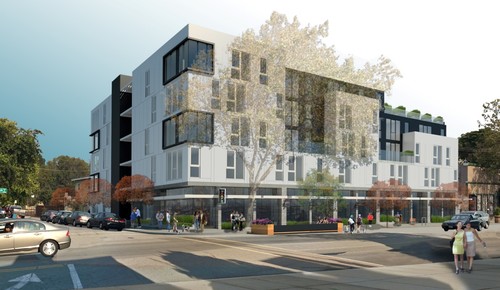On Tuesday in downtown Oakland, TransForm honored housing developers, cities, and transit agencies that have participated in its GreenTRIP program. The developers earned platinum-level certification under GreenTRIP, and the cities and agencies adopted some or all of the GreenTRIP policies into their planning processes.
GreenTRIP aims to reduce residents' transportation and living costs by reducing parking and car trips, making walking and biking safer, and helping preserve open space. TransForm, a nonprofit that focuses on the connections between transportation and housing, has developed several tools to help planners, developers, elected officials, and community members envision and create better housing. In addition to a database that helps figure out the true costs of building parking—and how much parking is actually needed, rather than required by local ordinance—TransForm developed GreenTRIP Connect to show the benefits of providing affordable housing in walkable areas near transit. The easy-to-use tool allows anyone to quickly compare the effectiveness and cost of different strategies to reduce car trips, such as offering transit passes or car-share to residents, or separating out the cost of parking spots from rent.
GreenTRIP also offers a certification program for housing developers. With a GreenTRIP certificate, a developer can show local decision-makers and communities how their development will reduce the need for parking in and around their buildings and contribute to a lively street scene while minimizing additional car traffic.
Housing developer Ali Kashani, who received the first GreenTRIP certification for Parker Place, a 155-unit apartment building in Berkeley, said that the certification helped convince the city to allow him to build less parking, which meant he could afford to build more units in the transit-rich area. Twenty percent of the building is affordable units. “Housing density is often driven by parking [requirements],” said Kashani. By providing transit passes for residents and other measures, he said, “I was able to reach the city’s maximum allowable density without suffering a reduction that would otherwise have been driven by the number of parking spaces.”
He praised GreenTRIP Connect as an easy-to-use, effective tool “for all parties, developers, community members, legislators, and decision-makers to plug in basic information about a project and receive a wealth of information about the benefits of designing for people, and not cars.”
The usefulness of the tool has been recognized by the Governor's Office of Planning and Research, which added a link to it on its recently updated General Plan guidelines website.
On Tuesday, TransForm's first award went to BART, the first transit agency to adopt GreenTRIP standards in its policies. BART president Rebecca Saltzman pointed out that the agency recently adopted both a transit oriented development policy and an affordable housing policy for its properties. “We have a goal of catalyzing equitable investment near every BART station,” she said. “Our goal includes 20,000 new homes and 4.5 million feet of commercial space at our stations by 2040. And 35 percent of the housing built on BART property will be affordable.”
“GreenTRIP is going to serve an important role in enabling BART to measure and report on our progress, which is important to us,” she added. “We want to be able to report on outcomes like reduced congestion and reduced greenhouse gas emissions, and we're grateful that TransForm has made it so much easier to tell that story.”
Awards were also presented to the city of Richmond, which changed its zoning code to require new developments to promote walking, cycling, and transit, and to discourage single occupant vehicle trips—and added a provision encouraging GreenTRIP certification to meet that requirement. The cities of Sunnyvale and Emeryville also received awards for including GreenTRIP policies in their guidelines.
Several housing developers received awards for being the first to receive platinum-level GreenTRIP certification for going “above and beyond” the standard certification requirements. These four developments provide no more than half the number of parking spots usually required, as well as transit passes for residents, car-share memberships, unbundled parking, bike parking, and an average of $14,000 per unit in extra transportation features so that their future residents will walk, bike, take the bus, and drive less.
Those developers, and some of their “above and beyond” efforts, are:
- RAD Urban, for 4700 Telegraph Avenue in Oakland. The developers purchased a car-share vehicle and will give residents a $100 annual driving credit.
- The Core Companies for 598 South First Street in San Jose. The developers are contributing $20,000 for bicycle infrastructure and have a shared cargo bike on site for residents' use.
- Anderson Architects for Montgomery 7 in San Jose. The company is sponsoring a bike-share station outside the building, which includes no parking.
- Build, Inc, for One Oak in San Francisco. The developers will build a new Muni elevator enclosure nearby, and will provide free annual bike tuneups and bike repair on site.
So far, GreenTRIP certification is only available in the San Francisco Bay Area, but TransForm hopes its usefulness will be recognized in other cities. Oakland mayor Libby Schaaf spoke of changes coming to that city, including a recent update to its parking requirements, and encouraged other cities to take on building more affordable housing. In Oakland, she said, “We want to house people, not cars. I hope that other cities notice that when Oakland did this revolutionary, radical thing, which includes zero parking requirements in downtown, as well as a parking cap--not just a minimum, but an actual maximum--these radical, dangerous ideas actually flew through our city council approval process without any controversy."
"So try it, you'll like it," she said.






